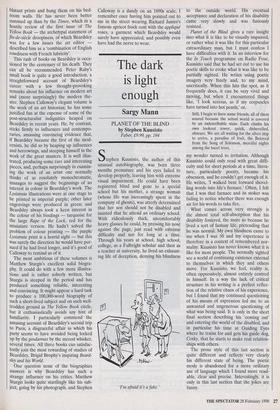The dark is light enough
Sargy Mann
PLANET OF THE BLIND by Stephen Kuusisto Faber, £9.99, pp. 194 Stephen Kuusisto, the author of this unusual autobiography, was born three months premature and his eyes failed to develop properly, leaving him with extreme visual impairment. He could have been registered blind and gone to a special school but his mother, a strange woman (whose life was increasingly spent in the company of ghosts), was utterly determined that her son should not be disabled and insisted that he attend an ordinary school. With ridiculously thick, uncomfortably heavy glasses he could, by pressing his nose against the page, just read with extreme difficulty and not for long at a time. Through his years at school, high school, college, as a Fulbright scholar and then as a teacher at university, he lived an exhaust- ing life of deception, denying his blindness 'I'm afraid it's a fake.' to the outside world. His eventual acceptance and declaration of his disability came very slowly and was furiously resisted.
Planet of the Blind gives a rare insight into what it is like to be visually impaired, or rather what it was like for this particular extraordinary man, but I must confess I have difficulties with it. In an interview for the In Touch programme on Radio Four, Kuusisto said that he had set out to use his poetic skills to evoke what it was like to be partially sighted. He writes using poetic imagery very freely and, to my mind, uncritically. When this hits the spot, as it frequently does, it can be very vivid and moving, but when I encountered things like, 'I look serious, as if my corpuscles have turned into hot pearls,' or, Still, I begin to have some friends, all of them soured because the actual world is covered by an indescribable stain. Each climbs his own lookout tower, quick, dishevelled, obscure. We are all waiting for the silver ship to arrive, a paradise of fruit, the Beloved from the Song of Solomon, merciful nights among the hazel trees, my wonder turned to irritation. Although Kuusisto could only read with great diffi- culty and for short periods at a time, litera- ture, particularly poetry, became his obsession, and he couldn't get enough of it. He writes, 'I walked bent forward shovel- ling words into life's furnace.' Often, I felt that I was that furnace and its stoker was failing to notice whether there was enough air for his words to take fire.
What comes across very strongly is the almost total self-absorption that his disability fostered, the more so because he lived a sort of fantasy life, pretending that he was normal. My own blindness came to me when I was 50 and my experience is therefore in a context of remembered nor- mality. Kuusisto has never known what it is like for most people. The normally sighted see a world of continuing existence external to themselves in which they and others move. For Kuusisto, we feel, reality is, often oppressively, almost entirely centred in himself. In a way the lack of critical structure in his writing is a perfect reflec- tion of the relative chaos of his experience, but I found that my continued questioning of his means of expression led me to an unwanted and ungenerous questioning of what was being said. It is only in the short final section describing his 'coming out' and entering the world of the disabled, and in particular his time at Guiding Eyes where he trains for and gets his guide dog, Corky, that he starts to make real relation- ships with others.
The prose style of this last section is quite different and reflects very clearly his different state of being. The poetic mode is abandoned for a more ordinary use of language which I found more read- able, clear and precise. Interestingly, it is only in this last section that the jokes are funny.


























































 Previous page
Previous page